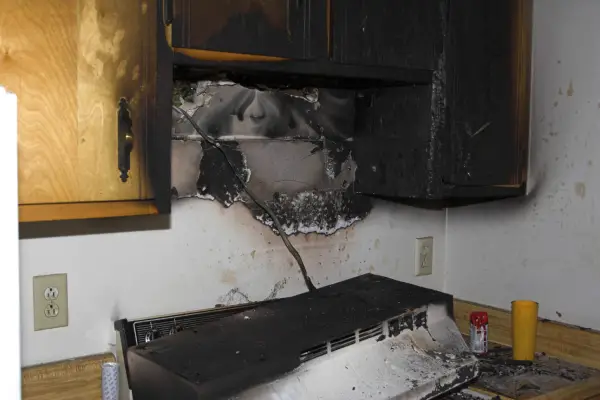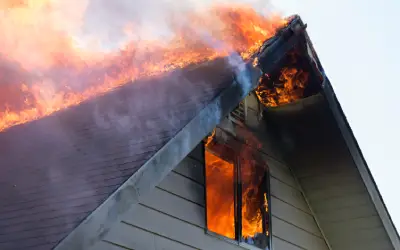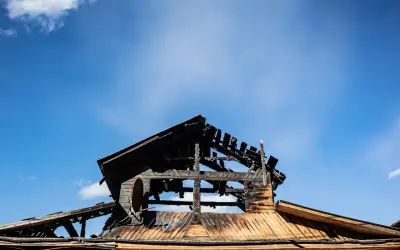
What happens after a house fire? It’s a big question, and breaking it down into smaller pieces can help. Let’s think about it based on how much time has passed since the fire.
Here’s what you should do:
- Do this ASAP after a fire: Start focusing on your immediate needs. Make sure everyone is safe and accounted for. Get medical treatment for loved ones and pets if necessary. Let friends and family know you’re OK. Find a temporary place to stay.
- 1-2 days after a fire: Get your documentation in order and communicate with your insurance company. This process may take a while, and it’s important that you get started right away. You can also look into financial aid options and house fire victims assistance at this time.
- Weeks and months following a fire: Start weighing your options as they pertain to rebuilding or moving on. Speak with a fire damage restoration specialist. Notify your creditors and accountant about what happened, as they may be able to offer temporary relief or adjustments to your payment schedule.
- Long-term after the fire: It can take a long time to recover from the trauma of a major fire. Seek counseling if needed, join a support group, and check in with loved ones to see how they’re coping.
Of course, every person’s situation is different, so it’s important to apply these basic principles to your set of circumstances. To help you do that, let’s dive a little deeper into the topic.
Your Emergency Can't Wait - At Your Door in 90 Minutes or Less
Call BCC Restoration now — 24/7 emergency response when you need it most.
360-467-8708Step by Step – What to Do After a Fire in Your House
Few situations are as frightening and can make you feel as helpless as seeing a fire ravage your home. But what happens after a fire? There are some key steps at every phase you can take that will help you retake control over the situation. From the immediate aftermath to long-term recovery, this is what we recommend.
Immediately After the Fire
If you’ve just been through a house fire, you’re probably in shock. Nevertheless, there are a few critical things you should do right away:

- Call 9-1-1 and render first aid if possible: Your priority is safety. Even if the flames are out, call emergency services to ensure the fire department and any necessary medical help arrive promptly. If anyone is injured, do your best to provide first aid while waiting for professionals.
- If anyone (or any pets) is injured, make arrangements to get them medical or veterinary help: Monitor for smoke inhalation symptoms. People and pets may have inhaled smoke while trying to escape. Be aware that smoke inhalation can have delayed effects.
- Let your friends and family know what happened and that you’re okay: Reaching out to friends and relatives can relieve their anxiety and help you gather emotional support, a place to stay, or other assistance.
- Find a temporary place to stay: “Where can I stay after a house fire?” This is one of the most common questions people have. Even if the damage seems minor, don’t assume that the house is habitable. Look for a safe place to stay — this could be with friends, family, or through local relief organizations.
- Stay out of the damaged house until an inspector or local fire authority has assured you it’s safe: Fire-damaged structures can be unsound. Electrical and gas lines may also pose hidden dangers. An official inspection helps you avoid unnecessary risks.
1-2 Days After the Fire – What to Do?
You’ll likely still feel shock and uncertainty in the days after the fire. During this period, it’s normal to experience emotional highs and lows — so try to take breaks, breathe, and remind yourself you’re making progress.
- File your insurance claim: Start the claims process as soon as possible. Provide them with all the details you have, even if they’re incomplete. They’ll guide you on the next steps, including any emergency services they might cover. Also, make sure you understand what fire and smoke damage is covered by insurance. Another option is working directly with a fire restoration company like BCC. When you call us first, we’ll assist you with communications with your insurance company, so you get the best possible care and support.
- Document the damage: Take photos and videos of every affected area — inside and out. This visual record is crucial for insurance claims, potential legal matters, and future reference.
- Get a copy of the fire report from the fire department: The fire report will outline the incident’s official details. This document is often required by insurance companies and may help determine the cause of the fire.
- Apply for financial aid*: Depending on your location, organizations like the Red Cross, FEMA, or local charities may offer emergency relief funds or temporary housing assistance.
- Locate valuables or important documents (if applicable): Only re-enter the structure if it’s deemed safe. Gather essentials like birth certificates, passports, deeds, and similar items to prevent further loss or damage.
- Shut off your utilities: If you’re not going to be living in the house, you don’t want to pay for utilities. Aside from that, fire damage can compromise electrical, water, or gas lines. Contact your providers to turn these off and prevent potential hazards, such as gas leaks or electrical fires.
- Secure your property: If possible, board up broken windows and secure doors. This step prevents vandalism or further damage while you sort out the next steps.
*How Does House Fire Victims’ Assistance Work?
Assistance may be available from various sources, each playing a crucial role in helping individuals and families get back on their feet. This may include food, shelter, clothing, and financial assistance. The exact details of what’s available to you may differ depending on where you live and the nature of the emergency. Here’s how you can determine your options:
- Reach out to The Red Cross: They can provide temporary housing, resources, and even financial assistance. They can help anywhere in the United States and should be one of your first calls. You can also try The Salvation Army for a similar range of services.
- Your insurance company can help: Many homeowners’ insurance policies provide for “Additional Living Expenses” after a disaster. This can be used to help pay for temporary housing, clothing, food, and other living costs.
- Community groups may be able to assist: These groups differ from place to place, but generally, the fire department or first responders can point you in the right direction to let you know who to contact for more information.
- Call 211: In the Vancouver WA – Clark County area, you can call 211 to get more information on aid groups that can directly help you.
- Government assistance: The Federal Emergency Management Agency (FEMA) may be able to help out if you’re underinsured or uninsured. They offer temporary housing, repair services, and other assistance based on needs. This is especially true if your home was lost in a widespread fire or wildfire, rather than an isolated house fire.
The Days and Weeks After the Fire – What Should You Do?
As time passes, the urgency shifts from immediate rescue to figuring out long-term recovery. Patience is key during this time – recovering from a home fire often lasts longer than you’d expect. Feeling overwhelmed is completely natural. Try to talk to someone if you do.
- Decide your next step: It’s a tough choice whether you’ll repair and stay in your home (if it’s salvageable) or if a different solution — like moving— might be necessary. Take some time and come up with the best decision for your family.
- Speak with a fire damage restoration specialist: If your home can be repaired, it’s essential to consult professionals experienced in fire damage. Fire restoration is specialized work involving soot removal, structural integrity checks, smoke odor control, and more. Calling in the fire damage restoration experts at BCC Restoration saves time, money, and stress in the long run.
- Notify creditors: Your financial situation may be impacted. Contact credit card companies, mortgage lenders, and other creditors to explain the situation. They may offer relief or temporary adjustments to your payment schedules.
- Notify your accountant: A significant loss can affect your taxes and overall financial health. Your accountant can guide you through documentation and potential tax deductions related to casualty losses.
- Ongoing communications with your insurance company: Filing a claim is rarely a one-time interaction. Keep notes of every phone call or email exchange. Save receipts for extra expenses — like temporary housing or urgent supplies — as some insurance policies might reimburse those costs.
The Long-Term House Fire Aftermath
Recovering from a fire can be a long journey, emotionally and logistically. It’s important to recognize this and pace yourself. Feeling discouraged at times is normal, and seeking help is a sign that you’re handling the situation responsibly.
- Continue monitoring your well-being and the well-being of your family: Stress, anxiety, and depression can emerge days, weeks, or even months after a traumatic event. Stay connected with loved ones, check in on each other, and look out for changes in mood or behavior.
- Join a support group: Connecting with others who’ve experienced similar losses can provide a sense of community and understanding that you might not find elsewhere.
- Seek counseling: Professional help can make a huge difference as you process grief and the upheaval caused by a house fire. Don’t hesitate to reach out to mental health professionals.
- Be prepared for the road ahead: It’s not uncommon for fire recovery to stretch beyond a year. Focus on small wins along the way.
Your Emergency Can't Wait - At Your Door in 90 Minutes or Less
Call BCC Restoration now — 24/7 emergency response when you need it most.
360-467-8708Should You Work with a Fire Damage Restoration Specialist After a Fire?

Yes. Restoring a home after a fire isn’t a standard “cleanup” job — it requires specific expertise, tools, and safety measures that only a professional fire damage restoration company can provide. A fire-damaged home can harbor soot in hidden corners, structural vulnerabilities that aren’t immediately obvious, and lingering odors that over-the-counter solutions simply can’t erase.
At BCC Restoration, we specialize in comprehensive fire damage restoration services that help you move on with your life. Here are a few ways we do that:
- Comprehensive damage assessment: We conduct a thorough examination of your home’s structural integrity, electrical systems, and ventilation. Hidden damage behind walls or in crawl spaces can lead to future issues if not identified and addressed early.
- Specialized soot and debris removal: Soot clings to surfaces and seeps into fabrics, carpets, and ductwork. Our fire restoration team uses high-powered equipment and specialized techniques to remove this harmful residue, preventing ongoing health hazards and preserving salvageable materials.
- Air quality and hazard control: Even after the flames are long gone, toxic particles and gases can linger. We’ll assess air quality, check for carbon monoxide risks, and deploy extra ventilation to ensure the environment is safe for occupancy.
- Smoke odor elimination: How do you remove smoke smell after a fire? It often takes professional help. Smoke smells can be stubborn and nearly impossible to remove with regular household cleaners. Our fire damage restoration specialists use industry-best deodorizers and methods to neutralize these odors at their source, rather than just masking them.
- Water and mold prevention: If firefighters use water hoses to extinguish the flames, you may also face water damage and potential mold growth. We’re equipped to dry out affected areas, treat for mold, and ensure the moisture doesn’t lead to bigger problems.
- Insurance coordination: We have experience working with insurance carriers and can help document the damage, communicate with adjusters, and expedite claims. This support can save you time, reduce stress, and help you receive the coverage you deserve.
Call Us for Fire Restoration in the Greater Portland Area
BCC Restoration has been proudly serving this community since 2008 with industry-leading practices and a commitment to fire damage restoration services that put our customers first. We understand how overwhelming the journey back from a fire can be, which is why we offer affordable payment options and work directly with insurance companies to advocate on your behalf.
Ready to take the next step? You don’t have to face this alone — let us put our expertise to work for you. Call us today to schedule a free assessment.
